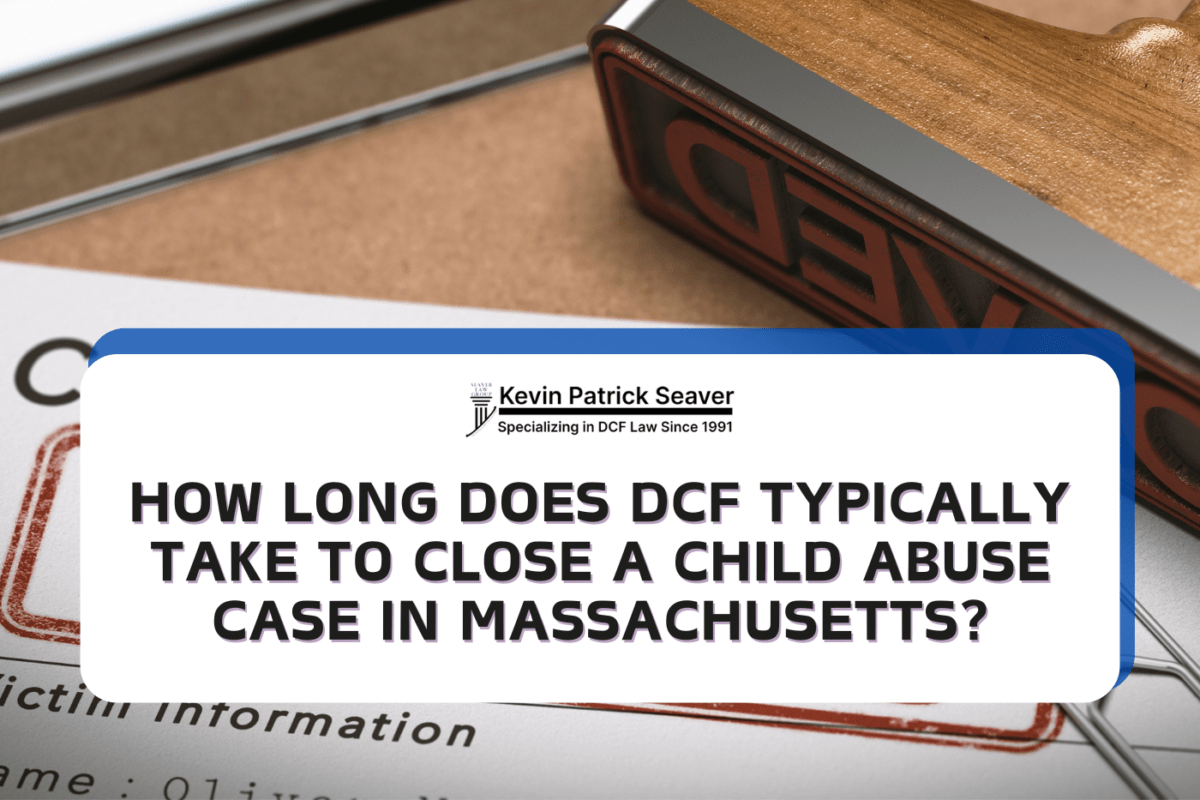How Long Does DCF Typically Take to Close a Child Abuse Case in Massachusetts?
Alt text: Close a Child Abuse Case in Massachusetts
Tom and Julie, parents of 5 kids and balancing multiple jobs to make ends meet, were already stretched thin when their situation took a turn for the worse. Despite their best efforts to provide a loving and supportive environment, they faced an unexpected challenge: a report of neglect filed by their children’s teachers. The accusation stemmed from a misunderstanding—the children’s unkempt appearances at school and their sometimes erratic pickup times—common issues for working parents but interpreted under a harsher light since teachers are mandated
reporters.
This report to the Department of Children and Families (DCF) plunged the family into a bureaucratic ordeal. For months, Tom and Julie navigated a maze of interviews, home visits, and action plans by social workers, all while continuing to juggle their jobs and the emotional needs of their children. The process felt never-ending, with each visit and assessment adding to the strain on their already fragile situation.
For families nearing the end of an assessment like the one Julie and Tom faced, it’s really important to understand what happens next.
If you’re close to finishing your DCF investigation and want to know what to do, this article will help you.
Understanding the Assessment and Closure Process of DCF
If you are navigating a DCF case in Massachusetts, understanding the specific timeline and steps involved in the assessment and closure process can be essential. Here is a clear outline of what to expect, from the initial report to the final decision, helping families like yours manage this challenging period more effectively.
1.Initial Report and Screening:
- Day 1: DCF receives a report and immediately screens it to assess the legitimacy, severity and urgency of the allegations.
- Day 2-5: If the report is “screened in” for further action, DCF classifies it as either an emergency or non-emergency response based on the immediate risk to the child.
2.Investigation Phase:
- Emergency Response: Within 2 hours of the report, DCF begins an emergency investigation, including a visit to the child’s location. The full emergency response, including family interviews and gathering information, is completed within 5 business days.
- Non-Emergency Response: DCF has up to 15 business days to conduct the investigation. This includes home visits, interviews with the child, family, and other relevant individuals, and gathering pertinent information.
- Investigation Completion: Following the investigation, DCF prepares a 51B report that details their findings and their decision. The allegations can either be unsupported, substantiated, or supported. If the allegations are substantiated or supported and the child will remain involved with the family, DCF will often open the case for an Assessment.
3.Assessment Completion:
- Day 15-45: Following the investigation, DCF prepares a comprehensive assessment report that details the findings and outlines any recommended interventions or services.
- Day 45-60: This report is reviewed and a decision meeting is held to determine the next steps, which may include additional services or case closure.
4.Decision and Closure:
- Day 60-90: Based on the assessment findings, DCF decides whether to substantiate the allegations and what interventions (if any) are necessary. This could range from closing the case if no evidence of abuse or neglect is found, to implementing a plan of action for family support and follow-up.
- Closure: DCF cases often take a very long time to close because new “concerns” will keep arising. We call this, moving the goal post. However, if no further risk is identified and the family has met any required conditions, DCF closes the case and discontinues involvement, ideally within 90 days from the start unless extenuating circumstances extend the timeline.
For families approaching the resolution phase of a DCF case, such as Tom and Julie’s, this detailed timeline provides clarity on what to expect at each stage. Effective communication with DCF, preparedness for assessments, and active participation in recommended interventions are key to navigating this process.
Why Do DCF Cases Take Long to Resolve?
The duration of DCF cases can vary significantly, often extending due to various complex factors that can complicate the resolution process.

1.Complex Family Issues: In situations involving large families or multiple allegations of child neglect, the DCF investigation process becomes inherently more complex.
For instance, a case involving five children might require individual assessments for each child, multiple home visits, and coordination with various agencies, which can prolong the overall case timeline.
2.Legal Challenges: Legal disputes arise when families are also accused of criminal acts. Such instances can lead to court proceedings, significantly delaying the case closure. The reason is that DCF is seen as an extension of the police. Engaging with DCF during a criminal proceeding will only give the District Attorney more information against you. Meanwhile, not engaging with DCF will mean your case won’t be closed.
While Julie and Tom haven’t been accused of any criminal acts, it is not uncommon for
false allegations of abuse to bring criminal charges as well. In fact, DCF is often required to make a referral to the District Attorney when they receive allegations of sexual abuse. Even if there are insufficient grounds to sustain criminal charges, the process could entrench families in protracted legal battles. This extends the duration and adds to the emotional and financial strain on the family.
3.Limited Resources: The capacity of DCF to handle cases efficiently is often hampered by high caseloads and insufficient staffing. In some regions of Massachusetts, it’s reported that social workers may manage between 15-20 cases at a time, surpassing the recommended limit of 12-15. This overburden can lead to delays in follow-ups and extended resolution times, impacting the timely closure of cases.
Understanding these dynamics can help families better navigate their interactions with DCF, setting realistic expectations about the timeline and potential complexities involved in their case.
How to Expedite Your DCF Case Closure
For parents like Tom and Julie, who find themselves entangled in a DCF investigation due to allegations of child abuse in Massachusetts, navigating the process efficiently is crucial to resolving their case quickly.
Here are several steps that can help expedite the closure of a DCF case:
1.Follow DCF Recommendations: If DCF suggests actions like attending parenting classes, counseling, or making home improvements, follow through diligently. Keep records of your participation and progress, as this will provide concrete evidence of your efforts to improve the situation.
2.Keep Detailed Records: Document everything related to your case, including dates and summaries of conversations with DCF workers, emails, and copies of any documents you provide or receive. This organization can be invaluable, especially if there are misunderstandings or disputes about what was said or done.
3.Maintain a Stable Environment: Show that your home is a safe and supportive environment for your children. This stability is key in DCF’s assessments and can work in your favor by demonstrating that the children’s needs are already being met.
4.Request Regular Updates: While it’s important to give DCF the space to do their work,
it’s also reasonable to request regular updates on the status of your case. This keeps you informed and engaged in the process and also keeps the case active on the radar of the DCF workers.
5.Utilize Support Systems: Engaging with community resources, support groups, or therapy can not only provide emotional and practical support but also demonstrate to DCF that you are actively seeking ways to improve your family’s situation.
6.Hire an Attorney: There are also many legal mechanisms that can be used to help if you believe your case should have already been closed. Hire an experienced DCF attorney to review your case, be present during home visits, and use legal mechanisms to ensure that your case is being handled properly.
Key Takeaway
Navigating a DCF case can be daunting, and families may be uncertain about reaching closure. By understanding the assessment process, recognizing factors that extend case durations, and taking proactive steps, families can better manage their DCF engagements.
Furthermore, hiring a competent DCF defense lawyer can be an essential step to holding the Department accountable and ensuring your case is closed promptly. For families like Julie and Toms, hiring an attorney could have given them the much needed bandwidth to focus on their family and careers. Letting your attorney handle your DCF case for you can not only save you time and energy, but also money, by getting your case closed sooner than it otherwise would have.
Expert DCF Defense at Your Service – Contact Kevin Seaver Now!
Understanding how long it can take for DCF to close a case is critical for any family navigating these complex waters. At the Law Office of Kevin Seaver, we specialize in managing DCF investigations, assessments, and fair hearings with a proven track record of turning the tide in favor of our clients. If you are overwhelmed by a prolonged DCF case, don’t face it alone.
Contact the Law Office of Kevin Seaver today at +1 617 263 2633 to schedule a consultation. We’re here to provide the expert guidance and support you need to achieve a favorable outcome. Don’t let the stress of uncertainty affect your family’s well-being. Call us now and take the first step towards resolving your DCF case.
DISCLAIMER
You find yourself in this situation, it’s advisable to seek legal representation from a qualified attorney, like those at the Law Office of Kevin Seaver, who can advocate for your rights and guide you through the complex process of a DCF investigation.
Remember that the ultimate goal of DCF is to ensure the safety and well-being of children while supporting families in crisis.
Please note that this article does not create an Attorney-Client relationship between our law firm and the reader and is provided for informational purposes only. Information in this article does not apply to all readers.
Readers should not rely on this information as legal advice and should seek specific counsel from the attorney based on personal circumstances. Thank you.
Kevin Patrick Seaver is a Massachusetts DCF Defense Lawyer who represents parents against false child abuse allegations.

Massachusetts DCF Defense Lawyer Kevin Seaver has been successfully fighting false child abuse allegations since 1991.


